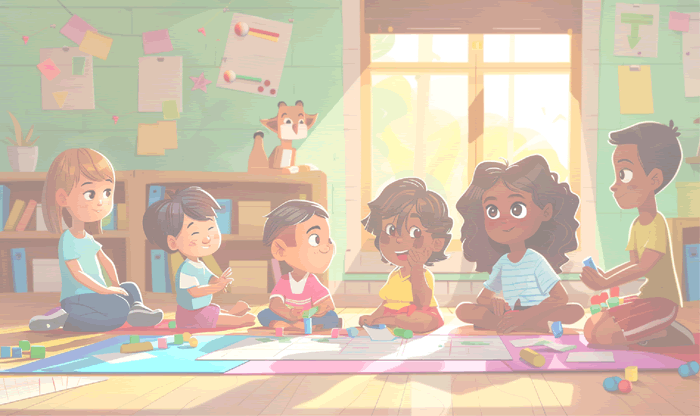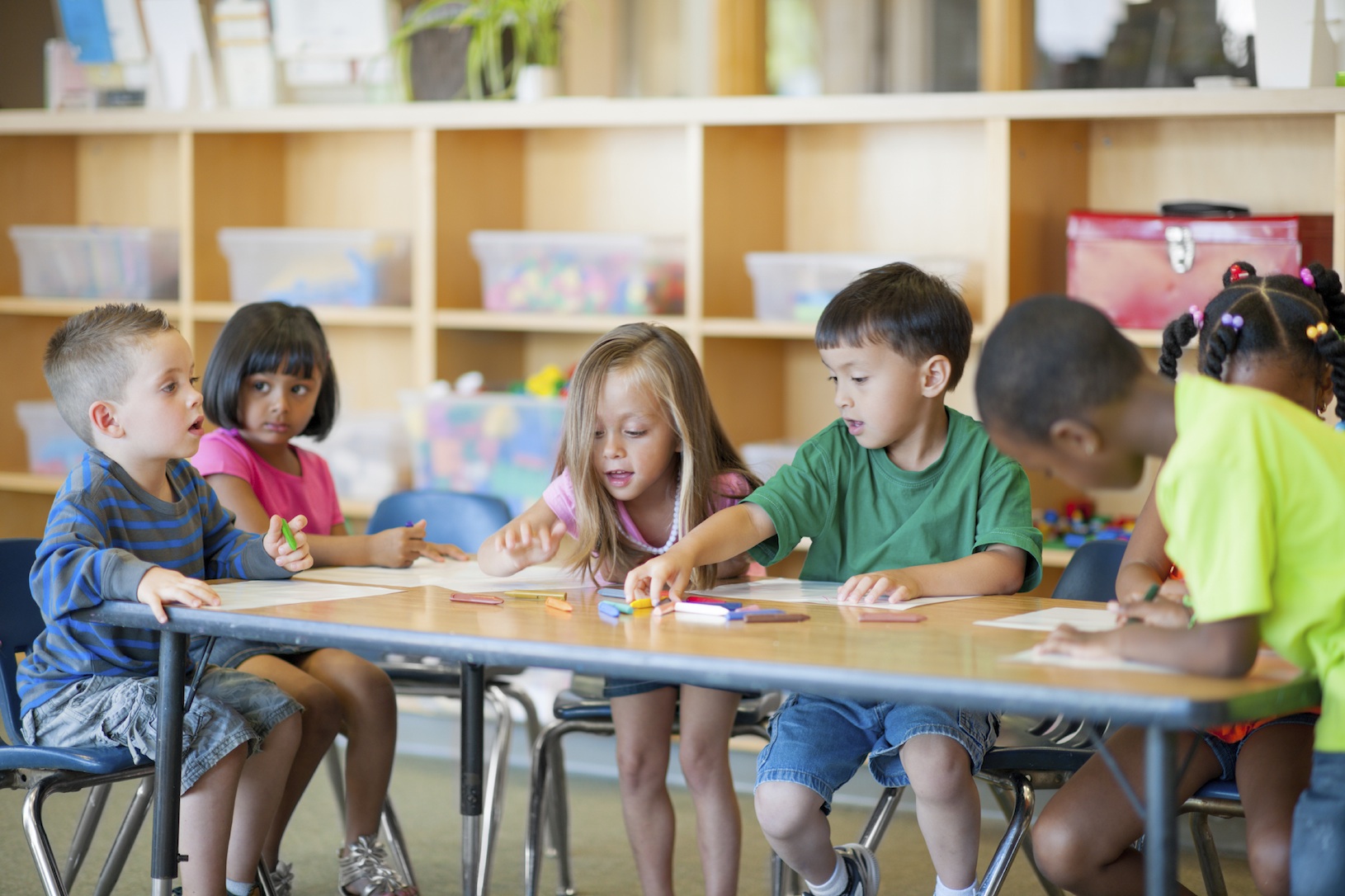The Relevance of Interactive Tasks in Grade College Education And Learning
Interactive activities play a crucial role in elementary school education and learning. They involve students and enhance learning outcomes. Through team projects and hands-on experiments, students experience the product in a useful way. This approach accommodates diverse understanding styles and promotes crucial skills. The benefits expand beyond academics. Exploring the much deeper impact of these activities reveals their importance in forming young learners' futures. What improvements happen when students proactively get involved?
Enhancing Involvement With Interactive Learning
Conventional teaching approaches have their values, interactive knowing considerably enhances pupil involvement in quality school education. This strategy encourages active engagement, permitting students to submerse themselves in the learning process. By using group activities, hands-on experiments, and technology-driven sources, instructors create an environment where pupils feel extra linked to the product.
Interactive understanding promotes cooperation amongst peers, cultivating interaction skills and synergy. It additionally satisfies diverse learning styles, making sure that aesthetic, acoustic, and kinesthetic learners can all grow. Additionally, pupils are a lot more most likely to preserve info when they proactively take part, rather than passively obtaining understanding.
This dynamic approach not only makes finding out satisfying yet also instills a feeling of ownership in pupils concerning their instructional trip. As they involve with the web content, their inquisitiveness and inspiration to learn rise, laying a solid foundation for future scholastic success.
Developing Critical Assuming Skills
Interactive learning not just improves engagement but likewise acts as a driver for developing crucial believing abilities in elementary school pupils. With activities such as problem-based learning, discussions, and hands-on experiments, students are encouraged to evaluate details, assess various viewpoints, and develop reasoned conclusions. These interactive experiences require pupils to doubt assumptions, leading them to assume even more deeply about numerous subjects.

Moreover, interactive tasks typically present real-world scenarios that test pupils to use their understanding artistically. By maneuvering via these challenges, they discover to identify appropriate info and make educated choices. This process fosters not only specific crucial reasoning yet likewise urges students to express their thought procedures, boosting their ability to communicate efficiently. Consequently, interactive understanding environments cultivate a generation of critical thinkers that are better prepared to tackle intricate troubles in their future scholastic and specialist undertakings.
Cultivating Partnership Amongst Peers
Cultivating cooperation amongst peers is vital in elementary school education and learning, as it improves teamwork and communication abilities. Engaging in team activities assists trainees construct depend on and regard for one another, preparing for efficient cooperation. Analytic with each other permits pupils to learn from each various other and develop a cumulative approach to challenges.
Teamwork and Interaction Skills
Efficient team effort and communication skills are necessary components of a successful elementary school education. Involving in interactive activities encourages students to collaborate, share ideas, and solve troubles with each other. Such experiences promote the growth of important communication capacities, allowing children to share their thoughts plainly and pay attention actively to others. Through team effort, pupils discover to value varied viewpoints, promoting a feeling of neighborhood and shared responsibility. Structured team tasks, whether in academics or imaginative tasks, improve peer interactions, teaching kids how to work out functions and fix problems. These abilities not just add to a favorable class setting but likewise prepare trainees for future collaborative undertakings in higher education and learning and the work environment. Generally, synergy and communication are fundamental to holistic development in grade college.
Building Trust and Regard
Structure count on and regard amongst peers works as a foundation for successful collaboration in quality institution settings. They are extra likely to engage proactively in team tasks when pupils feel valued and respected by their schoolmates. Interactive tasks, such as group projects and participating video games, supply chances for students to learn from each other, fostering a feeling of neighborhood. This atmosphere encourages open interaction, enabling trainees to express their ideas and point of views without anxiety of judgment. As trust fund builds, students become extra prepared to share responsibilities and support each various other's understanding. Ultimately, cultivating an environment of trust fund and regard improves not just scholastic end results however also social advancement, furnishing trainees with crucial social abilities for their future endeavors.
Problem-Solving With each other
Collaborative problem-solving engages trainees in crucial thinking and teamwork, vital skills for their academic and personal growth. When students interact to deal with obstacles, they learn to interact properly, regard varied perspectives, and leverage each various other's staminas. This procedure improves their ability to examine troubles from numerous angles and establish innovative remedies. Team visit here activities, such as scientific research experiments or mathematics challenges, promote energetic involvement and promote a sense of neighborhood. As trainees collaborate, they additionally build social abilities, learning to discuss and jeopardize, which are important for future interactions. Ultimately, analytic with each other cultivates a helpful knowing setting, encouraging trainees to take possession of their education and learning while preparing them for collaborative ventures past the class.
Encouraging Imagination and Advancement
Encouraging imagination and development in elementary school education can be greatly boosted via hands-on understanding experiences. These tasks permit trainees to involve directly with principles and products, cultivating creative thinking. Additionally, collaborative team tasks can boost diverse ideas and options, better nurturing a creative environment.
Hands-On Discovering Experiences
A wide range of hands-on learning experiences substantially enhances creative thinking and advancement in quality school education. Involving pupils in functional tasks allows them to apply theoretical expertise in real-world contexts, fostering deeper understanding. By controling devices and products, youngsters establish important analytic abilities and learn to believe outside the box. These experiences inspire inquisitiveness and encourage students to discover their passions even more. In addition, hands-on activities can connect different topics, connecting scientific research, art, and math in significant means. This interdisciplinary strategy urges pupils to see connections and assume artistically. Ultimately, hands-on knowing experiences nurture a generation of trendsetters, furnishing them with the abilities and self-confidence needed to take on future challenges and add to society in unique means.
Collaborative Team Projects
Hands-on discovering experiences naturally bring about the incorporation of collective group jobs, which play a crucial role in fostering creative thinking and development in elementary school education. These projects encourage pupils to work together, sharing ideas and perspectives, which boosts analytic skills and critical reasoning. Via partnership, students learn to connect efficiently and respect varied point of views, vital abilities for their future. In addition, team projects offer possibilities for pupils to experiment with various functions, boosting their versatility and self-confidence. Participating in this cooperative atmosphere allows them to discover their creative thinking, pushing the limits of typical discovering. Ultimately, collective group projects not just improve the academic experience yet likewise prepare trainees for real-world obstacles that need synergy and ingenious reasoning.
Building Confidence and Freedom
As trainees take part in interactive activities, they typically discover chances to develop self-confidence and self-reliance. These activities, whether they involve hands-on jobs, role-playing, or analytic tasks, encourage trainees to take initiative and express their concepts honestly. By taking part in such experiences, students find out to trust their capacities and choose without why not try these out relying entirely on support from peers or teachers.
Moreover, interactive activities foster a sense of ownership over knowing. They create essential assuming abilities and durability when pupils take on difficulties collaboratively or independently. This procedure not just enhances their understanding of the topic yet additionally equips them to take threats in their understanding journey.
As they browse various interactive scenarios, pupils gradually shed their self-doubt, paving the way for enhanced self-confidence - Private Grade School Peoria. Ultimately, these tasks play an important duty in nurturing certain and independent learners, furnished to encounter future academic and personal difficulties
Producing a Positive Classroom Atmosphere
While cultivating a positive class environment is necessary for effective knowing, it needs willful initiative from educators to create a room where trainees really feel secure, reputable, and involved. A favorable ambience urges collaboration, allowing trainees to express themselves without concern of judgment.
Educators can achieve this by developing clear assumptions, promoting shared regard, and acknowledging specific payments. Including interactive activities even more enhances engagement, making discovering more enjoyable and dynamic.
Furthermore, a caring setting sustains social-emotional development, as trainees learn to browse relationships and fix conflicts. Teachers play an essential role in modeling positive actions and enhancing a society of kindness her comment is here and inclusivity.
Regularly Asked Concerns

Exactly How Can Moms And Dads Support Interactive Knowing in your home?
Moms and dads can support interactive understanding in the house by providing interesting materials, encouraging hands-on tasks, including educational games, fostering discussions, and developing a nurturing environment that advertises curiosity and expedition in their youngsters's finding out experiences. (Private School)
What Sorts Of Interactive Tasks Are Many Effective?
Hands-on tasks, collective video games, role-playing circumstances, and instructional innovation applications are amongst the most reliable interactive activities. These involve pupils, improve crucial thinking abilities, and promote synergy, inevitably fostering a much deeper understanding of various topics.
Just How Do Interactive Activities Accommodate Various Knowing Styles?
Interactive tasks involve aesthetic, auditory, and kinesthetic learners by including varied methods. These tasks assist in recognizing with hands-on experiences, collaborative discussions, and visual help, permitting students to absorb info according to their recommended discovering design.
What Are the Costs Associated With Executing Interactive Tasks?

Executing interactive activities sustains prices such as products, training for teachers, modern technology upgrades, and possible center adjustments. Spending plan restrictions can additionally affect the regularity and selection of activities provided to trainees in educational settings.
How Can Teachers Assess the Impact of Interactive Learning?
Educators can analyze the impact of interactive discovering with observations, trainee comments, efficiency metrics, and relative analysis of examination ratings prior to and after application, making certain a thorough understanding of engagement and understanding retention improvements.
With tasks such as problem-based knowing, arguments, and hands-on experiments, students are motivated to analyze information, review different viewpoints, and develop reasoned final thoughts. Interactive activities usually present real-world scenarios that test trainees to use their understanding creatively. Engaging in interactive tasks urges trainees to collaborate, share concepts, and address problems together. Interactive activities, such as group jobs and cooperative games, supply chances for students to discover from one another, cultivating a sense of community. As pupils involve in interactive activities, they usually find opportunities to construct self-confidence and independence.